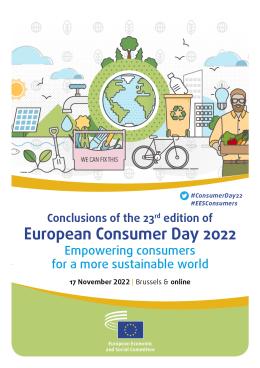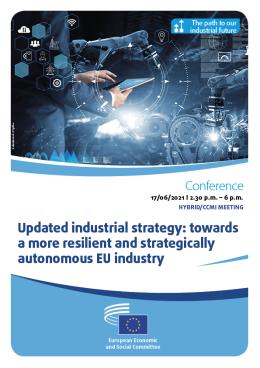European Economic
and Social Committee
Κυκλική οικονομία
Η μετάβαση στην κυκλική οικονομία βρίσκεται ψηλά στην ημερήσια διάταξη της ΕΟΚΕ ως λύση για την καταπολέμηση της κλιματικής αλλαγής και την προστασία του πλανήτη μας. Αποτελεί εξαιρετική ευκαιρία για την κοινωνία των πολιτών, καθώς μπορεί να συμβάλει:
- στη βελτίωση της ανταγωνιστικότητας της ευρωπαϊκής βιομηχανίας·
- στην προώθηση της βιώσιμης οικονομικής ανάπτυξης·
- στη δημιουργία νέων θέσεων εργασίας.
Το μοντέλο παραγωγής και κατανάλωσης «πάρε-φτιάξε-πέτα το» που εξακολουθεί να κυριαρχεί στην οικονομία μας δεν οδηγεί απλά σε σπατάλη πόρων, αλλά υπονομεύει και την καταπολέμηση της κλιματικής αλλαγής. Σε αντίθεση με τη γραμμική οικονομία, η κυκλική οικονομία αποτελεί σχεδιασμό με γνώμονα την ανατροφοδότηση και την αποκατάσταση, ο οποίος επικεντρώνεται στη δημιουργία και τη συγκράτηση οικονομικής αξίας, ενώ αντιμετωπίζει παγκόσμιες περιβαλλοντικές προκλήσεις όπως η κλιματική αλλαγή, η απώλεια της βιοποικιλότητας και η ρύπανση, έχοντας ταυτόχρονα οικονομικά οφέλη.
Το θετικό είναι ότι η μετάβαση στην κυκλική οικονομία συμβαίνει ήδη στην πράξη. Ενδιαφερόμενοι φορείς από την κοινωνία των πολιτών, συμπεριλαμβανομένων επιχειρήσεων, συνδικάτων, πανεπιστημιακών και κοινοτήτων γνώσης, οργανώσεων νέων και ΜΚΟ και άλλων ομάδων ενδιαφερόντων, δημιουργούν και εφαρμόζουν πολυάριθμες κυκλικές πρωτοβουλίες σε τοπικό και περιφερειακό επίπεδο. Η προώθηση των κυκλικών λύσεων και η ηγεσία από τους σχετικούς φορείς αποτελεί την καλύτερη ευκαιρία της Ευρώπης να επιταχύνει τη μετάβαση σε μια κυκλική οικονομία.
Σε αυτό το πλαίσιο, η ευρωπαϊκή πλατφόρμα ενδιαφερόμενων μερών για την κυκλική οικονομία, κοινή πρωτοβουλία της ΕΟΚΕ και της Ευρωπαϊκής Επιτροπής, συγκροτήθηκε το 2017 προκειμένου να συγκεντρώσει την κοινότητα κυκλικής οικονομίας στην Ευρώπη. Η πλατφόρμα φορέων στηρίζει τη μετάβαση της Ευρώπης στην κυκλική οικονομία καλλιεργώντας το διάλογο, το διαμοιρασμό της γνώσης και την ανταλλαγή βέλτιστων πρακτικών.









